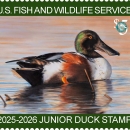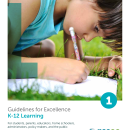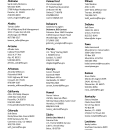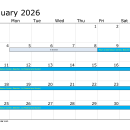Library
Are you a student interested in exploring wildlife, habitat conservation and visual arts? Do you want to investigate careers in biology or ornithology? Are you looking for ways to creatively express what you have learned in biology class? Do you have something to share with others about waterfowl and wetlands? Are you looking for educator and student resources?
Since its inception in 1989, the Junior Duck Stamp Conservation and Design Program has used a science-based art curriculum. Students are involved in hands-on learning opportunities, discovering the wonders of North American waterfowl, habitat characteristics, and conservation principles - all through a visual arts program.
Among the materials available to support this learning are four curriculum guides that help spark interest in wildlife and habitat conservation through science, art, math and technology focused lessons and activities. The final project or "visual term paper" is the opportunity to enter the Junior Duck Stamp art and conservation message contests.
Indoor and outdoor, year-round activities can be found in the Youth Guide. The Educator Guide is filled with resources to help teachers lead students in wildlife and habitat investigations.
Guides specifically designed for Homeschool and Nonformal Education (such as nature centers, wildlife refuges and youth groups) are tailored to these settings. All four guides concentrate on wildlife observation, nature journaling, photography, enjoying and exploring the outside world, and investigating the treasures of the National Wildlife Refuge System - or your backyard or local park wildlife area.
Written, field-tested and evaluated by environmental educators, biologists, teachers and consultants, these guides include such elements as using the Internet as a conservation tool and new scientific information about today's conservation challenges, including climate change climate change
Climate change includes both global warming driven by human-induced emissions of greenhouse gases and the resulting large-scale shifts in weather patterns. Though there have been previous periods of climatic change, since the mid-20th century humans have had an unprecedented impact on Earth's climate system and caused change on a global scale.
Learn more about climate change and its impacts on wetland habitat. They are multi-culturally relevant and incorporate information to stimulate students' interest in careers in nature.
While specifically written to address the needs of students in grades 5-8, activities encourage all students to engage with their natural world and develop a deeper appreciation of natural resources. The curriculum and activities meet National Science Education Content Standards, North American Association for Environmental Education (NAAEE) Guidelines for Learning, and National Visual Arts education standards for children in grades K-12, and other educational standards. The curriculum gives students - and educators - an opportunity to investigate what is fun, unique and mysterious about waterfowl and wetlands in North America.
Many Junior Duck Stamp State Coordinators also have state-specific program materials to help students explore the fascinating world of waterfowl and wetlands. Some states have items and exhibits that students and their families and communities may be able to borrow. National wildlife refuges and other wildlife areas make great outdoor classrooms and have events and activities that will increase your learning experience. We also offer an online waterfowl identification guide that will help you learn about ducks, geese and swans in North America, whether you find them on a refuge or in your local city pond.











